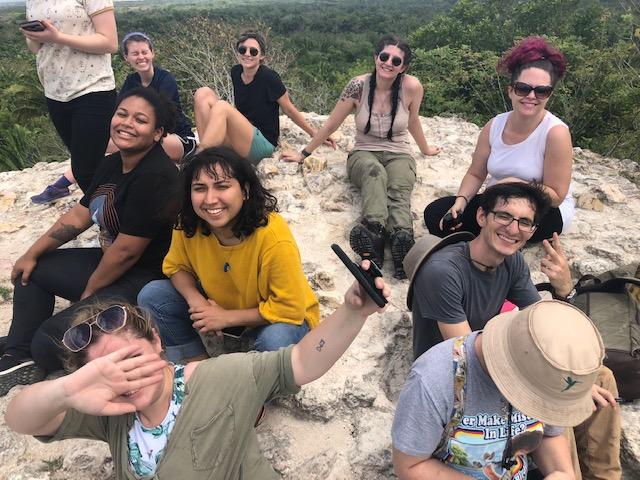Photo provided by Kayla Padilla
This summer I studied abroad in Belize through Texas Tech’s Field School in Maya Archaeology study abroad program. We excavated an average of seven hours per day, and during our “off day,” we always had some adventure to go on — whether it was hiking through the jungle to find a waterfall or swimming through Actun Tunichil Muknal cave. No matter what we did, we always worked with the looming pressure of the ominous Dr. Fly.
In fact, on our first real day of work, our professors warned us about Dr. Fly. While all of us silently agonized over this presumed top scholar, another student in the program raised her hand to ask when we would meet this intimidating individual. Tomas, one of our professors, assured us we would meet him, and oh, we most definitely did. But not until much later.
Every morning we woke up at 5:30 a.m. to get ready for breakfast; we’d later depart to the field at 6:55 a.m. When they first told us we all had to go to bed at 9:30 p.m., I thought, “yeah right.” As the weeks progressed, I kept telling myself, “I should really start going to bed at 9:00, 8:40, 8:30.”
When we worked in Gallon Jug, a site 20 minutes away from our lodge, our restroom was the jungle. Unfortunately for me, I have the orientation of someone who doesn’t have good orientation! Having gone far too deep in the jungle, I was temporarily lost all by myself; it seemed every tree looked the same. Eventually, however, I found my way back to our site. My preferred survival story isn’t one where I got lost because I chose to pee somewhere random, but here we are.
As much as I learned about archaeology during my time in Belize, what I truly mastered was the art of listening. Molly, a student from Kenyon College in Michigan, became my best friend abroad. She knows a good amount of Spanish, more than she realized, and is overall a funny, kind person. Nik from Florida loves cake, I mean a love that compels him to order cake almost every day. New York (a dude named Evan we nicknamed New York) is from New York, and he loves Guatemala. Alexia felt like a friend I had known for a lifetime.
One of the first workers I met upon my arrival in Belize was Ronda. Ronda is 25 and was born in Belize. She lived five minutes away from our cabanas. We mostly conversed in Spanish, and I went over to her house the afternoons I was free. I felt uncomfortable knowing that the only reason I knew the local people was because I was playing the role of an anthropologist. It was difficult being their friend while also knowing there was a power imbalance, and I was undoubtedly contributing to it. Studying abroad seemed to imply that other people’s living spaces were for me to learn about myself instead of those I was living with.
While Dr. Claire Novotny educated us on studying household structures and artifacts as a way to give us legitimate insight into daily Mayan life, Dr. Anna Novotny, a bioarchaeologist, communicated to us the importance of being self-aware when working with human bones. Meanwhile, Dr. Brett Houk and Dr. Tomas Gallareta taught us the significance of listening to the local people and their needs. The graduate students — Hillary, Julia, Taylor and Amy — helped all of us become better, more thoughtful archaeologists.
Being part of an archaeological field school was like being part of an elimination reality show. Like Agatha Christie’s “And Then There Were None,” one by one, we were all were falling victim to some form of illness. All of us were random characters put together in Chan Chich Lodge, each of us with waning health due to fatigue, dehydration and preexisting health conditions. Dr. Fly only added more discomfort to our already declining health.
It turns out Dr. Fly was not some refined scholar, but a special type of fly that when bitten by it, makes your skin swell. At times, I felt Dr. Fly resembled more than an insect: it represented the discomfort I felt navigating Belize as an anthropologist. During our long work days, the bites from Dr. Fly were a nuisance disconnecting us from the work at hand. In the same way, my status as a researcher prevented me from fully submerging myself in the community as an equal member. I didn’t find myself in Belize, but instead, I found friendship, community and inspiration to continue learning about the issues that affect the Belizean people, my friends.






